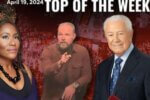Talk-show host Oprah Winfrey is one of the most influential people in the world. But many Christian leaders worry that her New Age spirituality may be leading people into deception.
Philanthropist, actress, role model, entrepreneur and syndicated talk-show host Oprah Winfrey is among the select few who are recognizable solely by their first names.
The leader in TV talk-show ratings for all but her first year on the air (1986), the 54-year-old has developed an influence extending far beyond America’s borders. Time magazine named her one of the world’s 100 most influential people each of the last four years.
Religious journalist Marcia Nelson, author of The Gospel According to Oprah, attributes the talk-show host’s popularity to her transparency. “She’s very human,” says Nelson, whose book ascribes Oprah with pastoral qualities such as good story-telling ability and an emphasis on generosity. “That’s the source of her connection. I expect there’s not a lot of difference between Oprah Winfrey and [her] persona.”
Her millions of fans include many Christians. Among them is charismatic pastor Cynthia Hale, founder of Ray of Hope Christian Church in suburban Atlanta. Hale says Oprah particularly influences women because she understands their joys and challenges. She says women connect with another woman who is so gracious and generous and underwrites women’s dreams.
Though she’s not a daily viewer of Oprah’s TV show, the pastor feels a combination of joy, sorrow and excitement when she sees Oprah giving to other women. “She inspires me,” Hale says. “I’m strong on faith and believe nothing is impossible with God … but Oprah makes me feel proud and excited to be a woman. I believe nothing is impossible when I watch her and see all the things she does and gives other women the power to do.”
Yet there is another dimension to Winfrey that doesn’t thrill Hale and other pastors and teachers. Despite being raised in a Baptist environment and having attended churches of other Christian denominations, Winfrey loves to explore spiritual topics that venture into New Age territory, they say.
In a clip broadcast on You Tube, Winfrey tells a listener she reconciled these teachings with her Christian beliefs because she opened her mind to the indescribable hugeness people call “God.”
“I took God out of the box,” she said on the clip. “I grew up in the Baptist church where there were rules, belief systems and doctrines.”
By taking God out of the box, her critics claim, she has abandoned sound teaching. “Oprah Winfrey is now the most influential preacher of New Age ideas, and she wins converts every day,” says Cky Carrigan, an evangelism professor at Southwestern Baptist Theological Seminary.
Winfrey’s actions give credence to the claim, such as the time she told an audience, “There are many paths to what you call God.”
For years she has hosted author Marianne Williamson, who rose to fame teaching A Course in Miracles, a self-study course including textbook, student workbook and teacher’s manual. The material was written by Columbia University psychologists Helen Schucman and William Thetford. Schucman credited an “inner voice” she described as Jesus with dictating its contents. It was first published in 1975.
In 1992 Williamson wrote her first book about the course, titled A Return to Love: Reflections on a Course in Miracles. Throughout 2008 she is discussing its 365 daily lessons on XM Satellite Radio’s Oprah & Friends channel. Also promoted recently on oprah.com was a 10-week Web seminar that concluded in early May. It reviewed the book A New Earth by itinerant spiritual teacher Eckhart Tolle.
A Course in Miracles has attracted considerable criticism. Detractors cite passages claiming that there is no sin, that a slain Christ has no meaning and that the name of Jesus is only a symbol as examples of content that conflict with biblical teaching. A Longmont, Colorado, minister and Bible teacher who has reviewed both authors’ works labels Williamson’s book “counterfeit” and Tolle’s “scary.”
“I went through some of Tolle’s examples,” says Sandra Clifton, a former psychic who published her story, From New Age to New Life, last fall. “He says it doesn’t matter what your thoughts are—to get in touch with them and dwell on them.
“[Tolle and Williamson] are both promoting self and overlooking sin. They don’t recognize sin—then there’s no need of a Savior to save us. It gets very confusing to the public because some of these teachers will mention Jesus Christ, but they don’t recognize Him as the Son of God.”
Clifton says she can see in these authors’ works ideas she once taught. But there is a danger in searching for fulfillment in philosophies and thought systems that contradict the biblical view of God. Clifton says New Age ideology is a religion of self and that its spread is a major concern.
While a guest lecturer at Oral Roberts University (ORU), Clifton wrote her doctoral dissertation on how parents can work with teenage children influenced by postmodern culture’s relativistic theories. Her research uncovered numerous examples of young people lured from the church into New Age thought. And at ORU, she has met students whose parents are involved in the New Age.
Although Clifton doesn’t think many Christians will follow Williamson’s course, she says the danger in it comes from hearing co-workers or acquaintances rave about it, or similar material, and then exploring it. “Christians could be drawn away from their faith,” Clifton says. “They could hear terms that sound like the Christian faith but they’re not. People need to get into God’s Word more.”
Houston-based Bible teacher and prayer leader Eddie Smith says the hazards of Winfrey’s support for mystical teaching extend to other areas. For example, she has promoted Reiki, a mystical, hands-on healing method for body and spirit that originated in ancient Eastern cultures.
“I think it’s an incremental slide into universalism or into things I think are contrary to the Word of God in dramatic fashion,” says Smith, who has written extensively on cults and false religions. “It causes people to place their faith in things other than Christ.”
Smith says with Winfrey’s help many people are beginning to believe God is in everything and that all roads lead to God—ideas he says are opposite to the truth. He also sees her courses as an expression of the humanism that he says is so rampant in American culture it has penetrated the church. Too many Christian leaders subscribe to the theory that God is all about meeting human need without requiring anything of the recipients, Smith says.
“It’s not because people have a wrong concept of God, but they have a wrong concept of sin,” he says. “If there is a God, they have to acknowledge the second step, that He is a living being. Then they have to acknowledge they don’t know His will and have probably violated it.”
Not only do many people deny the reality of sin, but they also embrace the theory that God exists only as a power or a flow of energy, not as a Person who defines right and wrong, Smith says. He thinks the challenge the church faces is to create a stronger consciousness of God, which will make this generation more aware of its failings.
Without the idea of sin, he notes, people don’t have to worry about life or what awaits them in the future. “When are people going to be held accountable for their sin?” he asks. “I could watch Christian television until 2009 and never see a simple gospel message. It’s pop psychology, and Oprah’s one of the pastors of the nation.”
James Robison, a Christian broadcaster and the co-host of Life Today, admits the church often has failed to effectively communicate the gospel. In an open letter to Winfrey released in April, Robison asks the talk-show host to give Christians another chance.
“I sense that you believe in God and want the best for all His people,” he writes. “What breaks my heart is that somehow we, as Christians, have failed to effectively communicate the greatness of our God to you.
“I cannot express how much I want you to fully experience the grace that God freely shares through Jesus Christ, as well as the supernatural enabling He provides ‘to live appropriately and victoriously in the now,’ as you eloquently put it.”
A spokesperson for Winfrey’s company, Harpo Productions, had no comment on the criticisms. Nelson defends her, saying Winfrey is living out her Christian faith in an inclusive way. Aware of her worldwide reach, Nelson says Winfrey is more likely to talk about God than Christ because the name “God” cuts across numerous cultures.
“I don’t like the way the term ‘New Age’ is used as an accusation,” says Nelson, a regular writer for Publishers Weekly and other magazines. “New Age is distinct from New Thought. What they both have in common is human potential.”
She thinks critics overreact, particularly to Tolle, who strikes Nelson as “benign” and a writer in touch with ancient wisdom from various world religions. After tracking questions posed by participants in one Web seminar, Nelson found that most people wanted to know how they could help friends or other family members.
“That’s what people go to religion for—for help with leading their lives,” Nelson says. “Their primary purpose is to seek help, and a second purpose is to seek instruction.
“People go to the church or institution they do because it speaks to their needs. Religious institutions that don’t speak to their needs are less likely to survive. That’s why fewer are going to [traditional] churches or are going to different churches.”
Hale isn’t convinced. Although she is not familiar with A Course in Miracles, the Atlanta-area pastor has seen guests on Oprah’s show whom she associates with New Age or other questionable beliefs.
Both Hale and Smith acknowledge that people searching for spiritual answers outside a biblical framework expose problems within the church. Yet Hale thinks this quest also reflects a craving for easy answers that don’t demand personal commitment.
Christianity is a faith of privilege but also one of responsibility that requires obedience, trust in God and adherence to biblical truth, Hale says.
“Often what I’ve discovered in this day and time is people don’t want to commit themselves and be responsible,” Hale says. “It’s easier to accept certain principles that leave you free to do whatever you want to do.”
She advises Christians to reject any New Age teaching, even when it comes from someone who is as popular or does as much good as Winfrey. She says the underpinning of New Age philosophy is the idea that humans can be their own gods, meaning they can determine their destinies and live without consideration for God’s expectations.
Hale recommends, however, that mature Christians monitor A Course in Miracles or similar presentations so they can address the concepts with other believers or discuss them with people outside the church.
For Hale, what’s most important is rejecting any way of thinking that doesn’t address the issue of sin.
“If we cannot [admit we sin], how do people recognize the fact that in and of ourselves we are depraved and doomed, except we give our life to Christ and be saved?” she asks.
“I take issue with any religion or philosophy that does not acknowledge original sin and sin that is practiced in our life.”
Ken Walker is a freelance writer based in Huntington, West Virginia.






Leave a Comment
You must be logged in to post a comment.